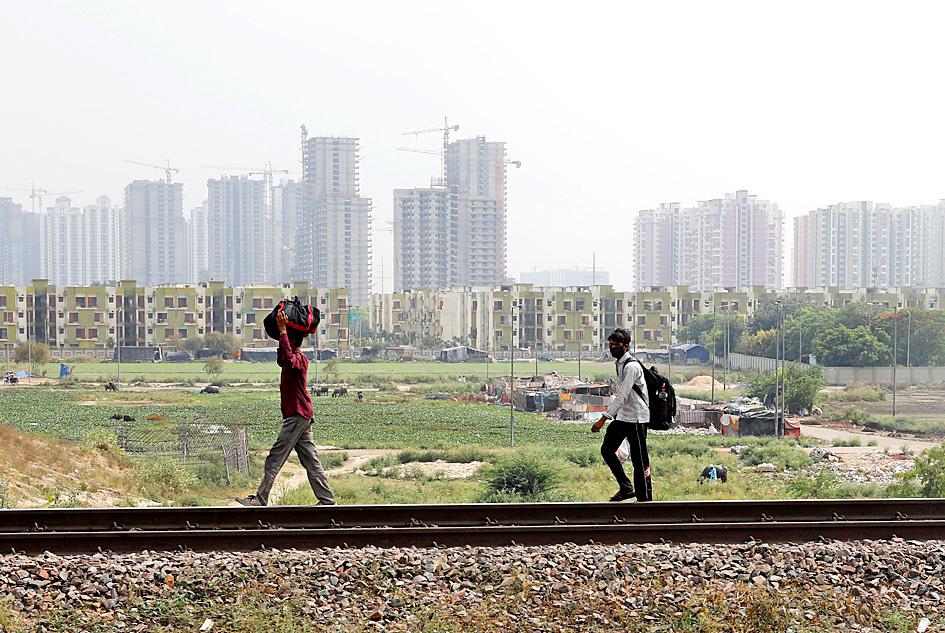The Indian government has pledged to spend US$265 billion, including US$40 billion in collateral-free loans to small businesses, to boost liquidity and help the economy weather the fallout of the COVID-19 pandemic.
The loans would benefit up to 4.5 million small businesses, Indian Minister of Finance Nirmala Sitharaman said in New Delhi yesterday.
“Essentially this is to spur growth and to build a very self-reliant India,” Sitharaman said. “It addresses ease of doing business, compliance and due diligence, and the intention is also to build local brands.”

Photo: Reuters
Indian Prime Minister Narendra Modi on Tuesday said that his government would spend an amount equivalent to 10 percent of the nation’s GDP to help the economy get back on its feet after weeks of stay-at-home restrictions to beat the pandemic.
The resultant halt to nonessential consumption set up Asia’s third-largest economy for its first annual contraction in four decades, as businesses collapsed and jobs were lost.
An estimated 122 million people lost their jobs last month, while consumer demand has evaporated.
Modi’s spending plan includes measures already unveiled by the government and by the Reserve Bank of India, such as the provision of cheap cash to banks and a reduction in its cash reserve ratio.
The details of the package are to be shared in tranches, Sitharaman said, adding that yesterday’s announcement covered 15 different measures, including six pertaining to small businesses, and that more would be announced over the next few days.
As part of the plan, small businesses would be eligible to borrow collateral-free automatic loans for a four-year tenor with a 12-month freeze on principal repayments. The loans would be guaranteed by the government.
“This economic package will be a crucial link in the creation of a self-reliant India,” Modi said. “It will focus on areas like land, labor, liquidity and law.”
Modi has come under criticism for the pain inflicted on India’s poor due to the sustained lockdown since the end of March.
In the past few days, the movement of millions of migrant workers from the cities where they had jobs to their homes in rural villages has dominated the news.
Companies have been urging the government for weeks to increase support measures.
Some restrictions were eased on April 20 to allow farmers and industries to resume operations in rural areas and in districts free of infection.
Still, companies are facing difficulties reopening factories because of travel restrictions, conflicting rules, broken supply chains and a shortage of workers.
The country has started running special trains to take stranded workers to their homes. Indian Railways also partially resumed passenger train operations from Tuesday, nearly two months after the services were stopped.

CHAOS: Iranians took to the streets playing celebratory music after reports of Khamenei’s death on Saturday, while mourners also gathered in Tehran yesterday Iranian Supreme Leader Ayatollah Ali Khamenei was killed in a major attack on Iran launched by Israel and the US, throwing the future of the Islamic republic into doubt and raising the risk of regional instability. Iranian state television and the state-run IRNA news agency announced the 86-year-old’s death early yesterday. US President Donald Trump said it gave Iranians their “greatest chance” to “take back” their country. The announcements came after a joint US and Israeli aerial bombardment that targeted Iranian military and governmental sites. Trump said the “heavy and pinpoint bombing” would continue through the week or as long

TRUST: The KMT said it respected the US’ timing and considerations, and hoped it would continue to honor its commitments to helping Taiwan bolster its defenses and deterrence US President Donald Trump is delaying a multibillion-dollar arms sale to Taiwan to ensure his visit to Beijing is successful, a New York Times report said. The weapons sales package has stalled in the US Department of State, the report said, citing US officials it did not identify. The White House has told agencies not to push forward ahead of Trump’s meeting with Chinese President Xi Jinping (習近平), it said. The two last month held a phone call to discuss trade and geopolitical flashpoints ahead of the summit. Xi raised the Taiwan issue and urged the US to handle arms sales to

A magnitude 5.6 earthquake struck off the coast of Yilan County at 12:37pm today, with clear shaking felt across much of northern Taiwan. There were no immediate reports of damage. The epicenter of the quake was 16.9km east-southeast of Yilan County Hall offshore at a depth of 66.8km, Central Weather Administration (CWA) data showed. The maximum intensity registered at a 4 in Yilan County’s Nanao Township (南澳) on Taiwan’s seven-tier scale. Other parts of Yilan, as well as certain areas of Hualien County, Taipei, New Taipei City, Taoyuan, Hsinchu County, Taichung and Miaoli County, recorded intensities of 3. Residents of Yilan County and Taipei received

Taiwan has secured another breakthrough in fruit exports, with jujubes, dragon fruit and lychees approved for shipment to the EU, the Ministry of Agriculture said yesterday. The Animal and Plant Health Inspection Agency on Thursday received formal notification of the approval from the EU, the ministry said, adding that the decision was expected to expand Taiwanese fruit producers’ access to high-end European markets. Taiwan exported 126 tonnes of lychees last year, valued at US$1.48 million, with Japan accounting for 102 tonnes. Other export destinations included New Zealand, Hong Kong, the US and Australia, ministry data showed. Jujube exports totaled 103 tonnes, valued at